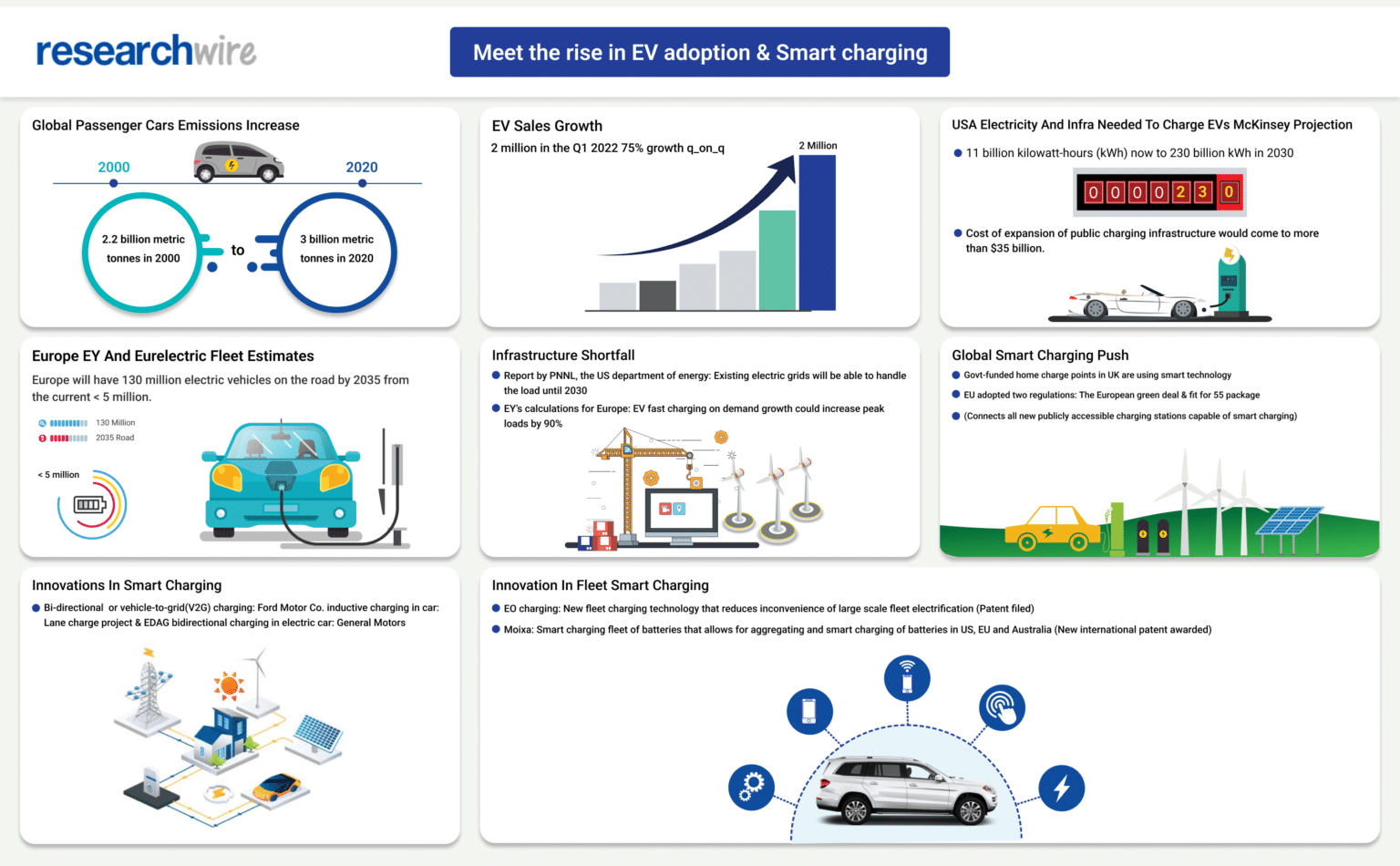Rohit Kumar is responsible for Researchwire European & North American business. He is an HEC, Paris 2008 MBA and Indian Institute of Technology (IIT) Kharagpur 2002 engineering graduate with close to 17 years of experience in business innovation and strategy, business development and client relationship roles. He is working with ResearchWire since 2016 and as a partner, is responsible for the growth of ResearchWire in Europe and North America.
Prior to ResearchWire, Rohit was handling sales strategy and pricing for Syniverse Technologies, a telecom services provider, where he was instrumental for growth in EMEA and India through product innovations, creative pricing and discounting models and executing strategic sales plans.
Rohit is based out of Luxembourg and has been living in Europe for last 12 years. He understands European & North American customers and their needs and ensures that our customers always have a local person to reach out whenever needed.
A Global Purview of EV Smart Charging Developments
In a world where sustainability is taking center stage, transport as a leading source of emissions needs to be urgently overhauled. Aside from the dip in pollution rates during Covid-19, cars have produced approximately three billion metric tons of carbon dioxide emissions worldwide in 2020, and this number has steadily risen over the past two decades, from 2.2 billion metric tons in 2000. Globally, the transport sector accounts for 21% of global emissions with road travel contributing three-quarters. Inger Andersen, Executive Director of UNEP has said, “Cleaning up the global vehicle fleet is a priority to meet global and local air quality and climate targets.”
Consequently, governments worldwide are encouraging increased adoption of electric vehicles (EVs) which produce much lower emissions than those that burn fossil fuels. It is estimated that 2 million electric vehicles (EVs) have been sold globally in the first quarter of 2022, a 75% increase over the previous year. As EVs become the universal choice, the current infrastructure will have to scale rapidly to support this.
McKinsey has estimated that as the number of EVs on the road increases in the US, the electricity needed to charge them would surge from 11 billion kilowatt-hours (kWh) now to 230 billion kWh in 2030. To meet this demand, nearly 30 million chargers would have to be made available – some would be installed at residences, and 1.2 million would be public chargers. The cost of hardware, planning, and installation for this expansion of public charging infrastructure would come to more than $35 billion.
We move to Europe where joint research by Ernst & Young and the electricity industry trade association, Eurelectric, estimates that Europe will have 130 million electric vehicles on the road by 2035. Europe’s EV fleet is expected to expand from its current base of less than 5 million to 65 million by 2030 and then double over the following five years. EY estimates that Europe will need 65 million chargers to fuel these EVs, with 85% of plugs installed at homes.
Grid Management for EV Integration
But expanded infrastructure alone will not be able to support large-scale EV adoption. Governments and utility companies will have to find a way to manage the increased load on the grids. In a report by PNNL, the US Department of Energy found that existing electric grids will be able to handle 24 million EVs until the end of the decade – but new strategies need to be looked at after that. Along European highway corridors, EV fast charging on demand could increase peak loads by 90%, according to EY’s calculations.
This is where managed charging strategies make their play, to tackle the strain on infrastructure and huge cost outlays that will accompany the increased adoption of EVs. Of these, smart charging is the most effective in balancing the interests of all stakeholders.
 What is smart charging?
What is smart charging?
A far cry from the EV charging devices that existed as far back as the 19th century which were large metal structures with cables and buttons, today’s smart charging technology is minimalistic, compact, and intuitive enough to make decisions on its own.
Smart EV charging or intelligent charging is a system where an electric vehicle and a charging device exchange data over a connection and the charging device does the same with a charging operator.
Smart EV charging manages grid loads and boosts cost-effectiveness by enabling a vehicle to communicate with the power grid, the utility company, and the charging point operator (CPO), through the internet, to choose charging strategies. These strategies trade off various parameters to enable power suppliers to meet the increased energy demand from the growing number of EVs.
In Copenhagen, Denmark, for example, some operators set rates three times as high as the usual between 5-8 pm on winter evenings, encouraging customers to plan their charging without overloading the grid
From the energy sources’ angle, smart charging technology can effectively integrate low-cost renewable energy into the grid. While these resources like water, solar, and wind have positive implications for sustainability, their dependence on the weather makes their availability volatile. To solve this impediment some smart charging solutions enable real-time responses such as balancing grids and adjusting the EV charging levels to maintain steady voltage and frequency.
In this way, smart charging cuts peak load, allows higher usage of renewable energy, and makes the charging process more optimal and economical without having to invest in expensive infrastructure upgrades or carbon-intensive, fossil-fuel power plants
The global push for smart charging
In tandem with the push for EV adoption, governments everywhere are also putting in place policies for the growth of smart charging. The UK leads the smart charging regulations race with measures that govern the use of EV chargers. In a bid to transition to zero-emission road transport and reduce emissions from conventional vehicles, in July 2019, the UK government announced that all government-funded home charge points would need to use smart technology to fulfill their commitment to the Road to Zero Strategy. Moreover, all new chargers sold from June 2022 are set to off-peak hours – 8 am and 11 am and 4 pm to 10 to avoid charging during peak hours. They have also installed over 100,000 home charge points.
To achieve a zero-carbon future and empower electric mobility the EU has adopted a series of initiatives. Two main regulations that aim at reducing CO2 emissions from transportation are the European Green Deal and the Fit for 55 packages. The Fit for 55 Package includes the Alternative Fuels Infrastructure Regulation (AFIR) proposal which digitally connects all new publicly-accessible charging stations in Europe and has made them capable of smart charging.
But challenges remain, and various players are unearthing several unique, experimental, and inventive ideas to make smart charging more effective and rapidly scalable. The bidirectional” or “vehicle-to-grid” (V2G) charging feature charges EV batteries while simultaneously allowing the batteries to push power back to the grid enabling an EV to become a powerhouse. Many automakers are embracing bi-directional charging including Ford Motor Co. which partnered with solar power company Sunrun Inc. to use its F-150 Lightning pickup truck to power homes.
State-of-the-art developments in EV smart charging
Not surprisingly, the industry’s steep transformation curve has fetched it many laurels.
The LaneCharge project that kicked off in 2019 developed a new process for inductive charging in late 2021 with their engineering partner EDAG. In this patented technique, the charging intelligence is embedded in the car and not the road. The new technology allows the car to acquire the required charge based on independent, autonomous decisions, ensuring each car is optimally charged. In addition to being an advancement on earlier methods where all cars were charged as per the car with the lowest needs, this vehicle-wise optimization saves time and money across the ecosystem.
In June 2022, General Motors won a patent for an innovation that equips electric cars with two ports of different properties for bidirectional recharging, enhancing a vehicle’s adaptability. This feature will be extended across other vehicles as well, the company says.
Moving to fleet-level innovation, EO Charging, an EV charging company has filed for a Patent for a New Fleet Charging Technology. The new technology takes the ‘plug-and-charge’ system previously used expressly in DC charging stations and creates an integrated AC plug-and-charge solution for fleets. The technology permits the exchange of information between the vehicle and the AC charging units and brings significant benefits to fleet operators by reducing the inconvenience of large-scale fleet electrification and third-party telematics providers. It also paves the way for V2G charging in the future across both AC and DC solutions.
Moixa’s Smart Charging Fleet Patents
Along with them, UK-based Moixa, an energy technology company that manufactures smart solar batteries and GridShare software which was recently taken over by electrification firm Lunar Energy, was awarded the New International Patents for Smart Charging Fleets of Batteries. The patents allow for aggregating and smart charging batteries in the US, EU, and Australia. An AI-enabled GridShare software aggregates fleets of batteries to provide ‘gigawatt-scale’, virtual power plants and helps balance electricity grids worldwide. They currently manage the largest single fleet of bi-directional batteries worldwide – 100MWh of batteries across 10,000 homes in Japan and have thus provided a blueprint for applying the technology to smart charge EVs. Moixa has already partnered with Honda to support the growth of EVs across Europe.
The future of EV charging is smart
The infrastructure available currently for EV charging is inadequate, making the need for extensive and sustainable improvement imperative. With its spate of innovations that optimize infrastructure and energy use, smart charging technology might well be the critical component that will drive change at scale. Governments, industry bodies, and large corporations need to keep pushing the boundaries of what is possible in this space for a carbon-negative future for all.
Our experts at Researchwire have a thorough knowledge of the rapidly evolving smart charging landscape and will be happy to discuss how our services ranging from landscape analysis to patent prosecution can support your forays in this area.



